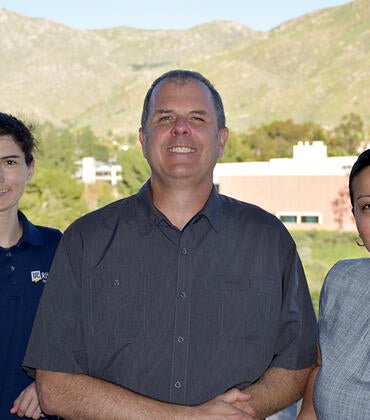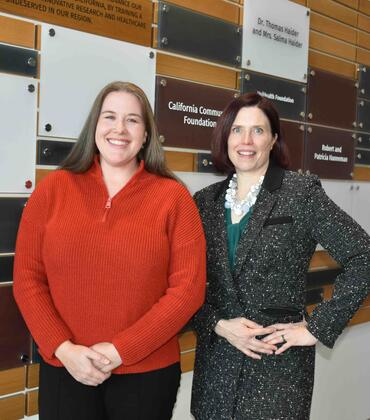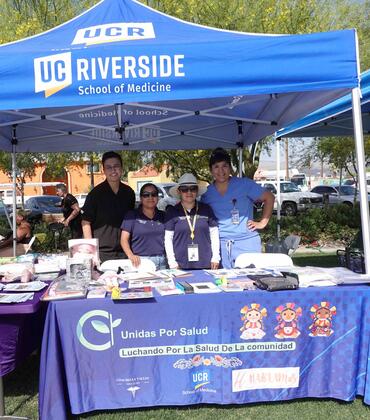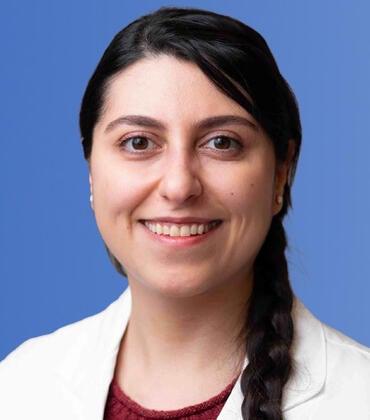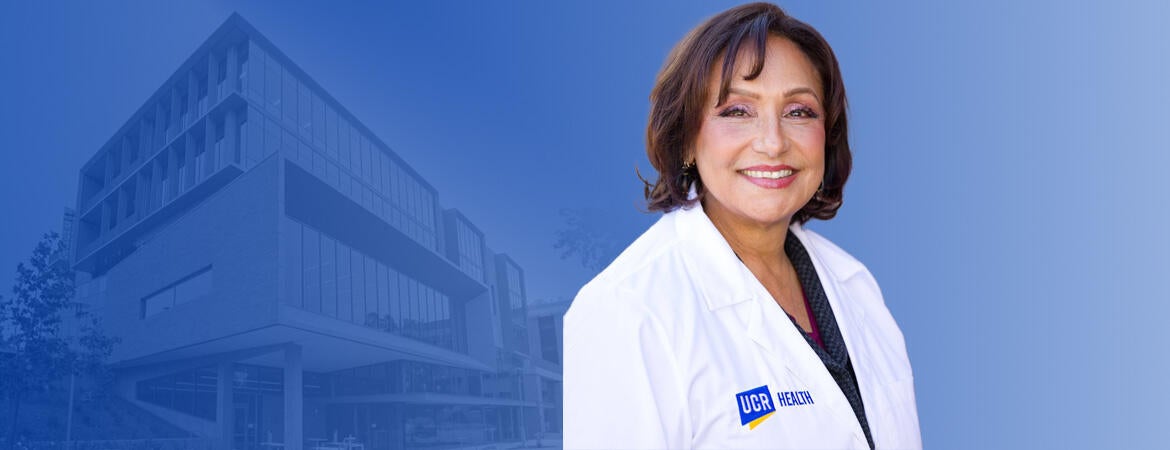
As a 15-year-old patient, Michelle Bholat, MD, MPH often found herself sitting for hours in Los Angeles County waiting rooms. “Nobody was checking in with you; it was like a cattle call,” she recalled. “That struck me then, as a teenager, and I thought, ‘No, this isn't okay.’”
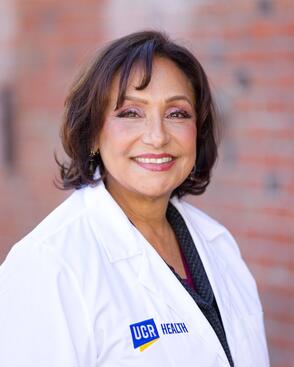
The experience inspired Bholat, who recently became chair of the Department of Family Medicine at the UCR School of Medicine and UCR Health, to become a physician. “I took that as a calling to say, I can make this better,” she said, adding that she aims to see all patients treated with dignity and respect. After earning her degree, Bholat began her residency training in the LA County Department of Health Services, a system where she received treatment and felt there were opportunities to improve patient care. She later became medical director of the Wilmington Family Health Center in Los Angeles.
In 1999, Bholat joined UCLA as the first Latina vice chair for the Department of Family Medicine. She said she never would have considered the move until she learned about the school’s affiliation with county hospitals that allowed her to continue serving the LA community. “I realized I could make an impact by ensuring that we share [resources], we collaborate, we work together,” Bholat said. As part of increasing access and linking graduate medical education to service, Bholat and members of the university and Department of Health Services created a new teaching health center for the UCLA Family Medicine residency training program.
Bholat also co-founded UCLA’s International Medical Graduate Program, which helps immigrant physicians obtain their medical licenses in the U.S. to address the shortage of primary care physicians while offering more culturally competent care. “That program was built on the fact that 39% of the population in California is Latinx/Hispanic, and only 5% of the physicians, so there was that gap,” Bholat explained. “From 2007 to 20024, we successfully matched 178 physicians in family medicine and the impact that I'm seeing [from] these doctors addressed the cultural and linguistic gaps.”
Working for over 25 years at UCLA, Bholat came to a realization. “The power of the University of California is huge,” she said. “When you pick up the phone and you say, I'm from UCLA, or I'm from UCR, or I'm from UC San Diego, that means something,” she continued. “One of my deans told me that you must always remember that the imprimatur of the University of California must mean that it's got to be excellence of the highest standards and quality, and I really do live by that.”
Creating something new at UCR
When the role of family medicine chair opened at UCR, Bholat saw an opportunity to build something new while continuing to make a difference in the lives of underserved patients in Southern California. “It’s exciting to take something that was young and growing and to be able to be a visionary and create all the steps to reach that vision,” she explained. The UCR SOM “is ready to grow, and needs people that are really committed and want to think outside of the box to achieve great things.”
At the UCR SOM, Bholat found colleagues just as committed to that vision. “When I met the people here, it just reinforced that it wasn't just a typewritten mission,” she said. “It was actually a lived experience that the people that were coming to UC Riverside in the School of Medicine were all on the same wavelength, that they achieved great things in their prior organizations, but wanted to get back to why they went into healthcare in the first place.”
SOM students and their families also inspired Bholat. Watching a recording of a recent commencement ceremony, Bholat noted the pride of families seeing their children become first-generation medical school graduates. As a first-generation physician herself, Bholat said, “It reminded me it was not the glitz and glamor, but really the genuine and authentic joy and celebration that was really so inspiring to me.”
In her new role, Bholat said she looks forward to encouraging medical students to pursue her specialty area of family medicine, a goal that also aligns with the SOM’s aim to increase the number of doctors in primary care.
“Never have I regretted choosing family medicine at all,” she said. “As I tell students, you get to do so many great things because as a generalist, you're constantly learning.” She added that family medicine may appeal to students who are interested in social determinants of health, a focus area of the SOM curriculum. “It’s for those that…really want to dig into thinking about the impact of financial strain, stressors, social isolation, things of that nature, and to be able to think in that way when you see a patient,” she said.
Bholat will be serving the community directly in her specialty of family medicine by working with UCR Health patients at Citrus Tower. In her role as chair, she also aims to expand the infrastructure at UCR Health and the SOM to add services for patients, increase the number of clinicians and clinical spaces, and build on the existing residency programs. “I want to see that the UCR Department of Family Medicine is on par with every sister academic center, and that it'll be a destination that our UCR Mission graduates want to come back to, and that our medical students will choose as their family medicine residency,” she said.
“A lot of our medical students have been doing some pretty amazing things, but then we don't keep them,” Bholat added. “There's nothing better than when you get the people that are part of the system to say, hey, I already know what we need, I know how to get things done, because I've been a part of the community.”
Addiction medicine research for the community
Bholat additionally plans to expand the SOM’s focus on addiction medicine with a new fellowship and increased research, including continuing her own research. “One in 12 patients in any waiting room has a substance use disorder, and I really feel strongly that that's a very big primary care opportunity,” she said.
She plans to work with Lisa Fortuna, MD, MPH, MDiv, chair of the Psychiatry and Neuroscience Department at the SOM, to create an addiction medicine fellowship at the SOM to add to the one that’s already in place in psychiatry. They are also considering a combined Family Medicine-Psychiatry residency program. “I really want my residents to leave here understanding this area, and I want to take the stigma out of addiction,” Bholat said.
Fortuna expressed her excitement about working with Bholat. “By combining our expertise, we aim to foster interdisciplinary training and research that will make a significant impact on health outcomes and reduce disparities,” she said. “I see so much potential.”
For Bholat, the overall goal is combining research with performance to improve care for community members. “I like to really marry the two and get a lot of work in building and working with my addiction medicine fellows and creating responsive connections from the clinic to community resources,” she said. Bholat added that she plans to work closely with the Department of Public Health, bring in addiction medicine specialists, and collaborate with Mark Wolfson, PhD, William R. Johnson Jr. and S. Sue Johnson Endowed Chair in the Department of Social Medicine, Population, and Public Health, on his health services research. “So I'm just seeing this all kind of coming together,” she said.
Making a difference, step by step
At UCR, Bholat said she’s excited to collaborate with her new colleagues and work through challenges to promote the SOM’s mission. “We realize that there are significant challenges for us at UCR, and mostly that comes from funding,” she said. “I personally know that our dean is committed to working with the legislators, and that is going to be ensuring that UCR is at that table and ensuring that we get that recognition of our work.”
Still, Bholat said, “I'm looking forward to working to build, with all of my colleagues, an infrastructure that will be looked at as a model of excellence, because I believe that all of us have come here with a tremendous wealth of experience and that we're just the kind of people that want to roll up our sleeves and get our hands in the dirt and get things going.”
While it may take time to see progress on the school’s mission to improve healthcare in the region, Bholat said that each new physician represents another step toward that goal.
“I don't like to think it's one doctor that's going to make all the difference, but the more doctors that you create, that feed into that mission and understand it, then you can make a huge impact on a community,” she said. “When I see that one person who I know will be a game changer for the community, it's just one plus one plus one plus one, and I want to make sure that that continues in all the work that I do.”
